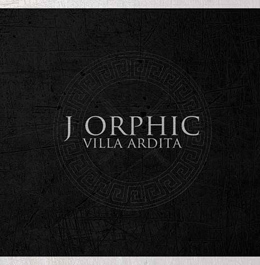
J Orphic are an Italian solo-outfit of Marco de Marco, hailing from the city of Milan. Under this moniker, Marco released two albums before (Sulla Terra via DNA Productions in 2009, and Cum Ipse Gratia one year later, via Ufa Muzak), as well as a split on SkullLine (2009) with French act Jörvallr (the latter did release material via Castellum Stoufenburc before as well, by the way). Then there was a period of relative silence, but now J Orphic return with Villa Ardita, an eleven-pieced full album that was actually recorded in Winter 2012-2013. J Orphic signed to Castellum Stoufenburc’s roster in order to have this third album released properly, and I do not think there was a better choice, for both parties totally fit to each other.
Villa Ardita finds its origin in the spirit of the XX century. Hierarch dies, concept remains. When the heroes die, people build their tombs. When the heroes die, monuments are constructed. When the heroes live, a land becomes a nation. Actually, J Orphic state not to be politically directing. However, the core shows a specific opinion, and seen the use of the samples (spoken words or quotes by historic figures; see later), you cannot deny a specific idea / opinion.
Anyway, let’s not fuzz about political correctness. First this, about the artwork: Cold Sun Arts once again… Sober, colourless (read: black and white) lay-out, edition in an A6-format. Just adorable!
But it’s the aural result that is of importance, for this is a review on a CD… So, the album… The track Mystic Choice opens the forty-two minute epos, and damn, what the f***! First there is some noisy-industrial and electronized piece with operatic choirs, soon joined by a bombastic and operatic synth-melody (truly beautiful), and then injected by a first vocal sample, martial synth melodies and electronic drum beats. The interaction in between those elements are repeatedly re-arranged whole the time, but it is so impressive to notice this balance of Neo-Classical, Martial Industrial and Dark Electro. We Are In The Desert Alone combines the glorious bombast of the Martial Industrial scene and those electronic beats, once again penetrated by vocal samples that add that specific war-propaganda-alike identity. But I really couldn’t guess this combination would / could result in such gloriously convincing way. Damn yeah, apparently it does. It’s like Waffenruhe or Triarii being re-interpreted by an early-nineties Dark Goth-EBM act from Germany. And that goes for pretty much the better part of this album. About each single piece is worth being mentioned, but some are even more impressive. Aurora Ventennale is not of the EBM-alike kind, yet oh so ominous, oppressing and militant; for sure one of the highlights on this album. Or what to think about Pripravite Put Gospodinu, combining classical and dissonant melodies, penetrated by weird vocal samples and disturbing synth passages. Take notice of the haunting, mesmerising voice of Lucija Hrvat too! And pieces like A Land Becomes A Nation or After The Victorious Battle are nothing but splendid interpretations of sonic satisfaction, being balanced in between militant and martial pride and mesmerizing / mind-transcending orchestration. Or what to think about, for example, the shamanistic female vocals at the end of Teatro Nazionale (Lucija once again?) or the noisy-chaotic structures on Mas…
This album for sure trespasses the safety of limiting boundaries. I am always into crossing those borders, but even I, right now, am almost totally brainwashed. I like to be masochistically overpowered (musically, of course, unless you’re of the female kind with a couple of big… eyes, and now I will shut myself up for this personal information is totally irrelevant – but I [self-censorship]) and with this piece of Aural Art, J Orphic succeed to intrigue deeply. Villa Ardita is not another average piece of Industrial but a well-thought collection of splendid compositions with quite some variation and, at the same time, a convincing coherence.
